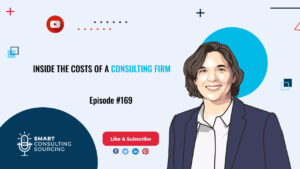Hello and welcome back to Smart Consulting Sourcing, your go-to podcast for the latest and greatest in consulting procurement. I’m Helene, your guide on this journey, and today’s episode is all about ‘Consulting and Disruption’. — yes, they’re buzzwords, but they’re buzzwords for a reason. We’re diving deep to explore whether the consulting industry is disrupted or truly experiencing disruption.
We’ll delve into the latest developments in the consulting world, with a special focus on the role of Artificial Intelligence. AI is not just a tech trend; it’s a game-changer in how consulting services are delivered and consumed.
The consulting landscape is undergoing rapid transformation, and it’s essential for you to stay informed and ahead of the curve. Understanding these changes is key to making informed decisions about procuring consulting services that best fit your needs.
So, whether you’re seeking to optimize your consulting spend or looking to harness the latest innovations in the field, this episode is tailored for you. Let’s dive into these transformative trends and unpack what they mean for your consulting engagements.
But first, let’s take a moment to recap the current state of the consulting market, a topic we covered in depth last week. Understanding where we are today is crucial to appreciating the journey to where we’re headed.
Here’s what you need to know from last week’s episode:
The consulting landscape isn’t just dominated by large firms anymore. Boutique consultancies are making a mark with their deep specialization and innovative approaches. Each of these firms brings its own unique methods and strengths to the table.
Consulting isn’t what it used to be. It’s a field in flux, significantly influenced by the advent of digital technologies and growing sustainability concerns. This evolution is blurring the lines between traditional strategy consultancies and digital-first firms, as they increasingly offer similar services.
The demand and focus areas in consulting vary widely across different regions. Emerging markets, especially in the Asia-Pacific and African regions, are emerging as new epicenters of growth, presenting exciting opportunities for both consulting firms and their clients.
Digital capabilities are now a staple in consulting services, leading to a gradual fusion of IT and management consulting domains. Artificial Intelligence, particularly in data analysis, is beginning to leave its mark, albeit still in the early stages of integration. This shift is altering the consulting value chain, enabling direct access to specialized services like market research and expert insights.
Looking ahead, the consulting industry is poised for some interesting developments. We’re likely to witness intense competition between strategy-focused and digitally-driven firms. Additionally, sustainability isn’t just a buzzword; it’s rapidly becoming a core element of business strategy, pushing consulting firms to adapt and innovate in this realm.
Interested in hearing more? You can catch up on all our episodes on Spotify, Apple Podcast, and YouTube. And if you’re looking to dive deeper into the world of consulting sourcing, don’t miss out on the resources available at consultingquest.com. From insightful white papers and engaging e-books to detailed transcripts of our podcasts, there’s a treasure trove waiting to spark your curiosity and enhance your knowledge.
Remember, sharing is caring! Spread the word among your professional circle and drop us a review. Your thoughts and feedback are what drive us to keep delivering high-quality content that matters to you.
Also, we’re thrilled to announce a series of interactive workshops. They’re designed to hone your skills in everything from negotiating with consulting firms to creating impactful RFPs. If you’re eager to join and enhance your consulting sourcing expertise, just send an email to hcl@consultingquest.com. Join us on this enlightening journey and take your consulting procurement skills to the next level!
Forewords on Disruption in Consulting
Today’s topic has been circling the consulting world for over a decade: disruption in consulting. Before we dive in, let’s define what we mean by ‘disruption.’ In business, disruption occurs when emerging companies with innovative solutions upend established industry leaders, fundamentally changing the market dynamics. It’s a force that rewrites the rules, creating new winners and, often, leaving the once-dominant players in its wake.
Now, what makes an industry a good candidate for such disruption? Typically, it’s a sector characterized by high margins, a consolidated landscape, and a degree of customer dissatisfaction—conditions that invite innovative, more agile players to carve out their space.
For years, we’ve speculated on the disruption of the consulting industry. With its lucrative margins and a relatively small number of firms holding the lion’s share of the market, consulting seemed poised for a shake-up. And yet, despite all the chatter and predictions, has the anticipated seismic shift in consulting actually happened?
Today, we peel back the layers of this question, examining the forces at play and the strategic moves by key players.
Has Consulting Really Been Disrupted?
The proponents of the “disruption in consulting” narrative have always perceived the consulting industry, traditionally characterized by high margins, as a candidate ripe for disruption. However, the expected seismic shift akin to what we’ve seen in other industries has not fully materialized. Instead, what we’ve witnessed is a more gradual evolution shaped by various forces.
Since the ’90s, the consulting market has been diversifying, with new players entering the scene, yet no single entity has disrupted the industry at its core. The top firms remain largely the same, with McKinsey, Bain, BCG, and the Big Four retaining their stature, albeit adapting to new market demands and incorporating technological advancements into their offerings.
One significant change is the internalization of consulting practices within corporations, leading to a rise in internal consulting groups, or Centers of Excellence. While this has impacted external consulting spend, it hasn’t negated the need for external advisory services, which continue to bring in fresh perspectives and specialized expertise.
Expert networks and specialized research firms have offered alternatives to traditional consulting services, providing targeted insights at a lower cost. However, these are seen more as complementary rather than outright substitutes, fulfilling specific niche needs rather than replacing comprehensive consulting engagements.
Marketplaces for talent and project-specific engagements have emerged, offering flexible solutions for certain scenarios but not displacing the need for larger, more integrated consulting projects.
The key argument against the disruption narrative is the nature of consulting work itself—it’s highly personalized, involves deep trust and relationship-building, and often requires complex problem-solving that is difficult to commoditize. While legal tech has significantly disrupted the legal industry by automating repetitive tasks, consulting tasks that involve strategic thinking and human interaction remain resistant to such disruption.
Moreover, the executives leading companies today often possess a consulting background, allowing them to undertake strategic initiatives in-house without needing the methodological support that traditional consulting firms offer. However, for large-scale transformations and integrations, external consulting expertise is still sought after.
As for the consulting industry’s response to disruptive forces, it has been proactive. Firms are embracing change, forming strategic alliances, and investing in digital capabilities. The landscape is also influenced by the increasing involvement of private equity in the consulting sector, driving growth and creating a more dynamic market for consulting services.
So, while the consulting industry is experiencing significant changes and seeing new entrants and models emerge, it has not undergone disruption in the drastic sense some had predicted. The industry continues to evolve, shaped by a combination of sustained value delivery, technological integration, and adaptive strategies by established and new players alike.
The Impact of Artificial Intelligence
Let’s now turn our focus to the captivating realm of Artificial Intelligence (AI) in the consulting industry. AI has been heralded as the most significant technological disruptor of our age, sparking both excitement and apprehension across industries. In consulting, a field deeply entrenched in human intellect and relational expertise, the encroachment of AI is a development that cannot be ignored.
Let’s first acknowledge the elephant in the room: AI, a pivotal element in the narrative of disruption in consulting has incited a certain ‘fear of psychosis’ dating back to the first industrial revolution, a narrative further fueled by the dramatic portrayals in movies and literature. But beyond the fiction, AI represents a tangible unease about technology’s capability to displace human roles.
Consulting, as an industry that thrives on human knowledge, faces the daunting prospect of AI potentially replacing the need for human consultants. This fear, while understandable, may be premature, given the current state of technology. The recent trend of consulting firms acquiring AI companies is not necessarily a harbinger of displacement but rather suggests a shift towards integrating AI into the consulting toolkit.
AI in consulting today is less about replacement and more about augmentation. It offers the ability to automate mundane tasks, analyze data at unprecedented scales, and circumnavigate operational barriers—complementing rather than eclipsing the human component of the business. The partnership between humans and machines is yielding a symbiotic relationship where AI’s data-driven insights and human creativity and emotional intelligence come together to provide superior service to clients.
Yet, there are intrinsic human skills that AI cannot replicate—at least, not yet. The skills of building meaningful business relationships, negotiating with a blend of empathy and understanding, and connecting with people on a level beyond logic and data are uniquely human traits. These are areas where AI falls short, unable to engage with clients in a manner that cultivates trust and fosters long-standing relationships.
Furthermore, the contextual reasoning that human consultants excel at—considering multiple factors like client goals, business culture, and industry tone—remains out of reach for AI. These limitations suggest that while AI may revolutionize certain aspects of consulting, it will not replace the profession’s human core.
As we look to the future, we must consider how AI will continue to shape the consulting landscape. Will it lead to a disruptive transformation, or will it catalyze an evolution of services? The evidence points to evolution. AI is driving competition between technology leaders and traditional strategy consultancies, compelling firms to understand and adapt to the process of disruption to succeed.
To ride the AI wave, consulting firms cannot afford to be hostile to change. Strategies like self-disruption, mergers and acquisitions, and strategic partnerships are becoming increasingly vital. Firms like BCG with their BCG Gamma, McKinsey with the acquisition of QuantumBlack, and Deloitte’s partnership ventures showcase a proactive approach to integrating AI into their business models.
Conclusion
As we conclude today’s insightful exploration of the consulting industry disruptions and the impact of AI, let’s focus on the essential takeaways that are vital for you to remember:
The consulting industry hasn’t really been disrupted like people thought it would be. Instead, it’s been slowly changing and evolving over time. We’ve seen things like more variety in the types of consulting services offered, companies bringing consulting practices in-house, and the emergence of specialized consulting options.
There are some new players in the game, but the big dogs like McKinsey and BCG are still going strong. They’re pretty good at keeping up with what the market wants. Expert networks and research firms actually offer different services that work well together, rather than being complete replacements for each other.
Even though companies are taking proactive measures like forming partnerships and investing in digital technologies to deal with disruptive forces, the industry’s main focus, which involves personalized and complex work, is not easily turned into a simple commodity.
And yeah, AI is often seen as more of a tool to enhance our abilities rather than something that can completely replace us. It’s great at improving efficiency, but it doesn’t quite have the same human skills like empathy and contextual reasoning.
Consulting firms are really focusing on integrating AI strategically. They want to make sure they can adapt to the changing landscape shaped by technology and keep delivering value.
Alright then! So, join us next time on Smart Consulting Sourcing as we delve into a continuation of this topic and have a closer look at the evolution of the consulting value chain. We’re set to dissect the ever-changing Consulting Value Chain and the implications it has on you, the clients. So stay tuned for that!
Thanks again for joining me on this episode about consulting disruptions and the impact of AI. Your thoughts and feedback are always welcome, so feel free to connect with me on LinkedIn or drop an email at hcl@consultingquest.com. You know I am always game for a chat.
Until next time, stay safe and keep up the smart consulting sourcing game. Au revoir for now, and happy sourcing!







